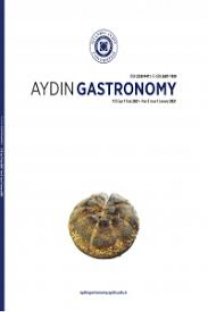Aşçılık Programında Okuyan Kadın Öğrencilerin Mesleğe Bakış Açılarının Değerlendirilmesi: Hatay Mustafa Kemal Üniversitesi Örneği
Bu araştırmanın amacı, Aşçılık Programında okuyan kadın öğrencilerin mesleğe bakış açılarının değerlendirilmesidir. Bu amaç doğrultusunda nitel araştırma yöntemlerinden olgu bilim (fenomoloji) deseni kullanılmıştır. Araştırma verileri, Covid-19 salgını nedeniyle online eğitim alan öğrencilere mail yoluyla iletilmiş ve gönüllü olarak araştırmaya katılan 16 öğrencinin verileri araştırmaya dâhil edilmiştir. Araştırmanın evrenini ise Hatay Mustafa Kemal Üniversitesi Antakya Meslek Yüksek Okulu Aşçılık Programı 1. sınıfta okuyan toplam 25 kadın öğrenci oluşturmaktadır. Araştırma sonucunda kadın öğrencilerin bakış açılarına göre uzun saatler çalışma, fiziksel güç gerektiren işler gibi çalışma koşulları ve anne-eş rolleri ile aşçılık mesleği, kadın aşçılara mesleki engeller oluşturmaktadır. Bu mesleki engeller nedeniyle meslekte erkeklerin egemen olduğu görülse de erkeklerin kadınlardan mesleki yetkinlik açısından üstün olmadıkları, hatta kadınların çocukluktan itibaren mesleğe daha yatkın oldukları sonucuna ulaşılmıştır
Evaluating the Profession Perspectives of Female Students Studying in the Culinary Program: The Case of Hatay Mustafa Kemal University
The aim of this research is to evaluate the perspectives of female students studying in the cooking department on the profession. For this purpose, phenomenology (phenomenology) design, one of the qualitative research methods, was used. The research data were sent to students who received online education due to the Covid-19 outbreak, and the data of 16 students who voluntarily participated in the study were included in the study. The universe of the study consists of 25 female students studying in the first year of cooking department in Hatay Mustafa Kemal University, Antakya Vocational High School. As a result of the research; in the cooking profession according to the perspectives of female students; Working conditions such as long hours and physically demanding jobs create occupational barriers for female cooks due to their roles as mothers and wives. Due to these occupational barriers, it was concluded that men are dominant in the profession, but men are not superior to women in terms of professional competence, and even women are more prone to the profession from childhood.
___
- Çelik, M. & Akar Şahingöz, S. (2018). İş Yaşamında Cinsiyet Ayrımcılığı: Kadın Aşçılar Örneği. Journal of Tourism and Gastronomy Studies,6(3): 370-383.
- Doğan, H. & Aktan, V. (2018). Mutfakta Kadının Rolü ve Yenilikçi Yaklaşımına Yönelik Muğla İl Merkezinde Bir Araştırma (A Research on the Woman's Role and Innovative Approach in the Kitchen in Muğla Province), Journal of Tourism and Gastronomy Studies, 6 (2): 60-73.
- Doğan, M. (2017). The Role of Cookery Vocation in The Tourism Sector on Women Employment. The Online Journal of Science and Technology, 7(1): 127-132.
- Ensari, M.Ş. & Alay, H.K. (2017). Meslek Seçimini Etkileyen Faktörlerin Demografik Değişkenler İle İlişkisinin Araştırılması: İstanbul İlinde Bir Uygulama. Humanitas, 5(10): 409-422.
- Harbalıoğlu, M. & Ünal, İ. (2014). Aşçılık Programı Öğrencilerinin Mesleki Tutumlarının Belirlenmesi: Ön Lisans Düzeyinde Bir Uygulama. Turizm Akademik Dergisi, 1(1): 55-67.
- İnce, Ş. (2016). Şeflerin Savaşı: Profesyonel Mutfaklarda Erkek ve Kadın Şefler. Hacettepe Üniversitesi İletişim Fakültesi Kültürel Çalışmalar Dergisi, 3(2): 409-435.
- Karadağ, A. (2002). Meslek Olarak Hemşirelik. Atatürk Üniversitesi Hemşirelik Yüksekokulu Dergisi, 5(2):1-8.
- Keskin, E. & Kızılırmak, İ. (2020). Mutfak Departmanında Çalışan Kadınlar: Cinsiyet Ayrımcılığı Üzerine Bir Araştırma. Uluslararası Sosyal Araştırmalar Dergisi, 13(69): 1210-1218.
- Kırılmış, Ş. (2017). Aday Öğretmenlerin, Öğretmenlik Mesleğine Karşı Tutumları (Denizli İli Örneği). Pamukkale Üniversitesi, Eğitim Bilimleri Enstitüsü, Eğitim Yönetimi, Teftişi, Planlaması ve Ekonomisi Bilim Dalı, Tezsiz Yüksek Lisans Tezi, Denizli.
- Kurnaz, A., Kurnaz Akyurt, H. & Kılıç, B. (2014). Ön Lisans Düzeyinde Eğitim Alan Aşçılık Programı Öğrencilerinin Mesleki Tutumlarının Belirlenmesi. Muğla Sıtkı Koçman Üniversitesi Sosyal Bilimler Enstitüsü Dergisi, 32: 41-61.
- MEB (2008). Aşçı Modüler Programı (Yeterliğe Dayalı). https://hbogm.meb.gov.tr/modulerprogramla r/programlar/yiyecek_icecek_hizmetleri/asci .pdf.
- MEB (2016). Meslek Ahlakı ve Ahilik. http://megep.meb.gov.tr/mte_program_mod ul/moduller_pdf/Meslek%20Ahlak%C4%B1 %20ve%20Ahilik.pdf.
- Orido, C. (2017). Challenges Faced by Female Chefs in The Kenyan Hospitality Industry: A Study Through an African Oral Tradition of Storytelling, Auckland University of Technology, Hospitality Management, Yayımlanmamış Doktora Tezi, Auckland, New Zealand.
- TDK, (2020). Güncel Türkçe Sözlük. https://sozluk.gov.tr/
- Yıldırım, A., Şimşek, H. (2016). Sosyal Bilimlerde Nitel Araştırma Yöntemleri. Ankara: Seçkin Yayıncılık
- Yılmaz, H. & Çemrek, F. (2019). Aşçılık Programı İle Gastronomi Bölümünde Okuyan Kadın Öğrencilerin Aşçılık Mesleğine Yönelik Tutumları: Afyon Kocatepe Üniversitesi Örneği. Journal of Gastronomy, Hospitality and Travel, 2(2): 141-156.
- ISSN: 2528-9411
- Yayın Aralığı: Yılda 2 Sayı
- Başlangıç: 2017
- Yayıncı: İSTANBUL AYDIN ÜNİVERSİTESİ
Sayıdaki Diğer Makaleler
Ebru KEMER, 0000-0001-9686-4118
Moleküler Gastronomi Uygulamaları: Sous Vide Yöntemi
Üniversite Öğrencilerinin Fermente Süt Ürünleri Tüketim Alışkanlıklarının İstatistiksel Analizi
İlkay YILMAZ, Ecem AKAY, Arda ER
Yeni Tip Koronavirüs (Covid-19) Salgınının Dünya Gıda Sistemi Üzerindeki Etkileri
Geleneksel Anadolu Tören Yemekleri
